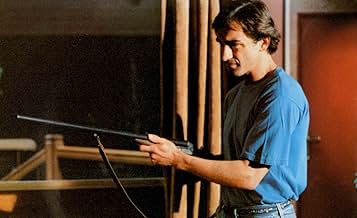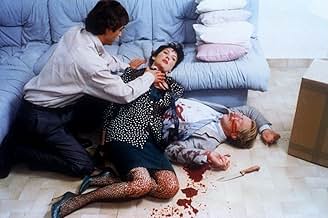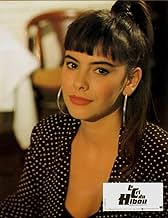Le cri du hibou
- 1987
- 1h 42min
CALIFICACIÓN DE IMDb
6.3/10
1.1 k
TU CALIFICACIÓN
Agrega una trama en tu idiomaAfter separation from his wife Robert moves to Vichy where he observes beautiful Juliette. Her fiance Patrick becomes jealous and attacks Robert. When Patrick disappears Robert is suspected ... Leer todoAfter separation from his wife Robert moves to Vichy where he observes beautiful Juliette. Her fiance Patrick becomes jealous and attacks Robert. When Patrick disappears Robert is suspected to have killed him.After separation from his wife Robert moves to Vichy where he observes beautiful Juliette. Her fiance Patrick becomes jealous and attacks Robert. When Patrick disappears Robert is suspected to have killed him.
- Dirección
- Guionistas
- Elenco
- Premios
- 1 premio ganado y 1 nominación en total
Opiniones destacadas
Patricia Highsmith created one fascinating character in her novel: Nickie, the ex-wife of Robert Forester, here called Veronique. Virginie Thevenet plays her and she is terrific. Seductive, lying, violent and completely fascinating, she is the one thing in the movie that really works. Malavoy acts like a Boy Scout troop leader, May is dull and lifeless and Kalfon is hard to believe as a detective. Only Penot as the beefy handsome coward Soulages manages to rise to Thevenet's level.
Chabrol was known for his cold, passionless thrillers; you went to them out of a sense of duty. Wasn't he after all one of the founding members of the New Wave? See it if it turns up on late night TV, and there's nothing else to watch.
I had wanted to buy this one for a long time, but repeatedly postponed it due to the excessive price-tag of the DVD and the criticism leveled at the quality of the transfer (which was decent to my eyes even on a 40" TV monitor, if somewhat dark and with the burnt-in subtitles being intrusively large and bafflingly situated towards the middle of the screen!). Anyway, I eventually took the plunge not too long ago and am extremely glad I did – what with the accompanying Audio Commentary alone proving value for money!
The film is a well-regarded effort from Chabrol's middle period, given added prestige by being adapted from the work of celebrated crime novelist Patricia Highsmith. Incidentally, it makes for an excellent example of the director's admiration for Alfred Hitchcock (who had himself brought Highsmith's STRANGERS ON A TRAIN to the screen back in 1951), building suspense and goading the audience into complicity in much the same way as the acknowledged master of the form – though the noir trappings of the narrative (and, by extension, the expressionistic quality of the cinematography here) actually derives from Fritz Lang, another strong influence.
The plot – reportedly, a very faithful rendition of the novel – seems simple enough at first: a slightly disturbed man (about to be divorced) spies on a beautiful neighbor and, when he finally confronts her, realizes that she is herself essentially unbalanced (being willing to drop her current boyfriend and take up with him!); in this regard, the film reminded me a good deal of PRETTY POISON (1968). However, things get complicated when the boyfriend proves both jealous (though the male protagonist never actually consummates the affair!) and violent (even if he has to be saved from drowning himself when the situation comes to a head!), and even more so when the hero's malicious ex-wife becomes involved.
Interestingly, when the boyfriend goes missing, not only is his 'rival' suspected by the Police but, in a delicious reversal of Chabrol's own LA FEMME INFIDELE (1968), the girl rejects rather than endorses him – to the point that she tragically takes her own life (the panoramic shot revealing her lifeless body amid the tall grass is a brilliant touch). Surprisingly, the latter stages turn into outright black comedy as the boyfriend's repeated bungled attempts on the hero's life leave many of those around him lying in a pool of blood – including the boyfriend himself and the ex-wife in the astounding climax (capped by an ambiguous freeze-frame which leaves the protagonist's destiny hanging in the balance).
Another definite asset here is the well-chosen cast: while I was familiar with Mathilda May as the volatile heroine (best-known for playing the nude space vampire of Tobe Hooper's LIFEFORCE [1985] but who also had an important supporting role in Chabrol's recent A GIRL CUT IN TWO [2007]) and vaguely aware of Jean-Pierre Kalfon (portraying the bemused cop on the case), perhaps the most impressive was Christophe Malavoy in the central part (who proving a veritable magnet for disaster likens him with the lead character of Luis Bunuel's delightful 'non-serial killer' black comedy, THE CRIMINAL LIFE OF ARCHIBALDO DE LA CRUZ [1955]!). This analogy is also mentioned in the Audio Commentary featuring one Ric Menello and David Kalat (President of All Day Entertainment, which released the DVD) who provide a comprehensive, scholarly yet entertaining analysis of the film, its tortuous distribution background, as well as a broad look at Chabrol's prolific career.
The film is a well-regarded effort from Chabrol's middle period, given added prestige by being adapted from the work of celebrated crime novelist Patricia Highsmith. Incidentally, it makes for an excellent example of the director's admiration for Alfred Hitchcock (who had himself brought Highsmith's STRANGERS ON A TRAIN to the screen back in 1951), building suspense and goading the audience into complicity in much the same way as the acknowledged master of the form – though the noir trappings of the narrative (and, by extension, the expressionistic quality of the cinematography here) actually derives from Fritz Lang, another strong influence.
The plot – reportedly, a very faithful rendition of the novel – seems simple enough at first: a slightly disturbed man (about to be divorced) spies on a beautiful neighbor and, when he finally confronts her, realizes that she is herself essentially unbalanced (being willing to drop her current boyfriend and take up with him!); in this regard, the film reminded me a good deal of PRETTY POISON (1968). However, things get complicated when the boyfriend proves both jealous (though the male protagonist never actually consummates the affair!) and violent (even if he has to be saved from drowning himself when the situation comes to a head!), and even more so when the hero's malicious ex-wife becomes involved.
Interestingly, when the boyfriend goes missing, not only is his 'rival' suspected by the Police but, in a delicious reversal of Chabrol's own LA FEMME INFIDELE (1968), the girl rejects rather than endorses him – to the point that she tragically takes her own life (the panoramic shot revealing her lifeless body amid the tall grass is a brilliant touch). Surprisingly, the latter stages turn into outright black comedy as the boyfriend's repeated bungled attempts on the hero's life leave many of those around him lying in a pool of blood – including the boyfriend himself and the ex-wife in the astounding climax (capped by an ambiguous freeze-frame which leaves the protagonist's destiny hanging in the balance).
Another definite asset here is the well-chosen cast: while I was familiar with Mathilda May as the volatile heroine (best-known for playing the nude space vampire of Tobe Hooper's LIFEFORCE [1985] but who also had an important supporting role in Chabrol's recent A GIRL CUT IN TWO [2007]) and vaguely aware of Jean-Pierre Kalfon (portraying the bemused cop on the case), perhaps the most impressive was Christophe Malavoy in the central part (who proving a veritable magnet for disaster likens him with the lead character of Luis Bunuel's delightful 'non-serial killer' black comedy, THE CRIMINAL LIFE OF ARCHIBALDO DE LA CRUZ [1955]!). This analogy is also mentioned in the Audio Commentary featuring one Ric Menello and David Kalat (President of All Day Entertainment, which released the DVD) who provide a comprehensive, scholarly yet entertaining analysis of the film, its tortuous distribution background, as well as a broad look at Chabrol's prolific career.
This film THE CRY OF THE OWL (original title LE CRI DU HIBOU) is the first of two film adaptations of the mysterious and disturbing novel by Patrician Highsmith, and of course is filmed in French because it is directed by Claude Chabrol. A second film of the novel, shot in English, was released in 2009, also called THE CRY OF THE OWL. I have not seen it so cannot compare the two, though it is difficult to image that it equals or surpasses this one, which is made by a master often called 'the French Hitchcock'. The story starts in a creepy way. The character Robert, played by Christophe Malavoy, is a harmless variety of 'peeping Tom', who for weeks obsessively watches the character Juliette, played by Mathilda May, going through the activities of her evenings at home, cooking, eating, having a drink, sitting and watching television, etc. One night Juliette encounters him on her lawn and they speak. He admits that he likes watching her, but instead of being horrified, she invites him in for a drink. She is lonely and discontented, and unafraid. In this way a strange friendship commences between them, and they go on seeing each other, but can never confess to anyone the bizarre way they have met. This situation does not go down well with the character Patrick, played by Jacqes Penot. He had believed himself engaged to Juliette, but she is tired of him and breaks off her relationship with him. But he is even more obsessed with Juliette than Christophe ever was, and becomes not just insanely jealous but violent. The film becomes rather surreal as Chabrol explores the murky neuroses and motivations of the complex characters. Things get less and less comfortable, and we become more and more disturbed by what we are watching. Nor is it easy to figure out what is really going on in all the aspects. We discover that Christophe has a strange ex-wife named Véronique, played by Virginie Thévenet, who at first just seems a very merry and mischievous person. As the story progresses we realize that she is entirely insane, far more mentally disturbed even than the violent Patrick, and extremely dangerous, not to say murderous. So this means the four main characters are all unbalanced. Thévenet's performance is harrowing in the extreme, maniacally brilliant, and her character is so disturbed it's almost enough to frighten you off ever visiting France again, just in case there's another one out there. The story is revealed in unexpected ways, frightening emotional revelations being fundamental to the way the plot evolves. Patrick disappears and a police investigation commences. We then discover that he has gone into hiding in a small hotel, hoping that Christophe will be accused of murdering him, which indeed he is. In this way, Patrick seeks revenge for Christophe taking 'his' woman away from him. But that is only the beginning of an incredible spider's web of intrigue, and to explain what is revealed subsequently would ruin the viewer's fun. So instead of only not revealing the ending of the film, I am not even going to reveal what happens after we reach the middle of the story. There are are so many surprises that it is up to the viewer to discover them by watching this bizarre film.
M. Chabrol has done a strong, creditable job of transferring the powerfully discomforting world of Patricia Highsmith to the screen. Highsmith's characters become moral monsters through a condition of absolute confidence in their own warped psyches. These characters never learn, or understand themselves. Their lies to each other are absolute because they lie to themselves absolutely. No cliché goes unpunished. Characters become moral monsters without losing their sense of rightness. They seem powerless not to act in self-destructive ways.
The film is not equal to "Strangers on a Train" or "Purple Noon," other adaptations of Highsmith's work. But it is faithful in spirit to a novel which is itself not equal to the literary sources of these films. See it with an open mind and revel in the creepiness. Chabrol is a sufficiently great artist to allow another great artist her night cry.
The film is not equal to "Strangers on a Train" or "Purple Noon," other adaptations of Highsmith's work. But it is faithful in spirit to a novel which is itself not equal to the literary sources of these films. See it with an open mind and revel in the creepiness. Chabrol is a sufficiently great artist to allow another great artist her night cry.
A film described as being "in the Hitchcock tradition" usually means "a cheap imitation", and this French import is no exception. Director Claude Chabrol tries hard to invoke the spirit of the Master by adapting his screenplay from a story by Patricia Highsmith (author of 'Strangers on a Train') about a divorced artist with a fixation about birds (sound familiar?), whose voyeuristic attraction to the unhappily marries Mathilda May leads to a perfectly innocent, platonic friendship between two manic-depressive people. The plot kicks into gear after May's jealous husband disappears; birdman Christophe Malavoy is then accused of foul play, and the film goes to pieces in a hurry, collapsing into a random sampling of routine plot twists before ending in an unfair, inconclusive freeze-frame. It might have been an entertaining whodunit, but unlike his mentor Chabrol takes his scenario far too seriously: you only have to imagine the actors speaking their dialogue in English straight from the subtitles to realize how silly it really is. The film was made in 1987 but until 1991 was never released on this side of the Atlantic, and for good reason.
¿Sabías que…?
- TriviaOne of two adaptations of Patricia Highsmith's novel "The Cry of the Owl" that was released the same year, the other adaptation is Der Schrei der Eule (1987).
- ConexionesVersion of Der Schrei der Eule (1987)
Selecciones populares
Inicia sesión para calificar y agrega a la lista de videos para obtener recomendaciones personalizadas
- How long is The Cry of the Owl?Con tecnología de Alexa
Detalles
Contribuir a esta página
Sugiere una edición o agrega el contenido que falta

Principales brechas de datos
By what name was Le cri du hibou (1987) officially released in Canada in English?
Responda



























